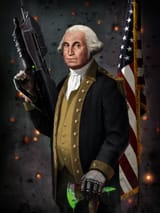Search Results
7/4/2025, 3:35:26 AM
Being an American, you grow up hearing all these stories about how heroic George Washington is in school (or at least I did growing up in the 90s). And then you start to roll your eyes at them, but once you really dive into the story of his life, you realize all the hype is warranted.
I can talk about his abilities as a military commander, as a politician and statesmen, as a central mythical leader of his people ect. but his conduct at Valley Forge is amazing.
The Continental Army was on its last legs, faced defeat after defeat, and then a brutal winter set in as they ran away with their tales between their legs. Most of the soldiers year long enlistment was about to run out too, so many could easy just walk away. Not only that, but the continental congress was broke, none of the soldiers were getting any supplies OR paid. It got to the point where Washingtons officers plotted to stage a mutiny against him. When Washington heard of this, he simply called the officers to a meeting, looked at them, and said he was disappointed in their conduct. This made them all regret ever consider plotting against him, theres reports of many of them breaking down in tears, and they all rallied behind him after.
This sort of X factor of a historical leader is amazing to me. Has any historian ever studied something like this? What are some other examples?
I can talk about his abilities as a military commander, as a politician and statesmen, as a central mythical leader of his people ect. but his conduct at Valley Forge is amazing.
The Continental Army was on its last legs, faced defeat after defeat, and then a brutal winter set in as they ran away with their tales between their legs. Most of the soldiers year long enlistment was about to run out too, so many could easy just walk away. Not only that, but the continental congress was broke, none of the soldiers were getting any supplies OR paid. It got to the point where Washingtons officers plotted to stage a mutiny against him. When Washington heard of this, he simply called the officers to a meeting, looked at them, and said he was disappointed in their conduct. This made them all regret ever consider plotting against him, theres reports of many of them breaking down in tears, and they all rallied behind him after.
This sort of X factor of a historical leader is amazing to me. Has any historian ever studied something like this? What are some other examples?
7/3/2025, 7:50:52 AM
>>529746224
Nice
Nice
Page 1

